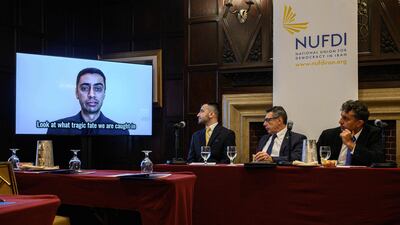Follow the latest developments from the UN General Assembly here.
An Australian-British woman and two Iranian men who were detained for years by Tehran have filed a lawsuit in a US court against Iranian President Ebrahim Raisi.
The civil case, filed just before Mr Raisi's visit to New York for the UN General Assembly, comes amid mounting international backlash against Iran's treatment of prisoners after the death of Mahsa Amini while in the custody of the morality police.
The plaintiffs are using the 1992 Torture Victim Protection Act, which allows victims to pursue justice through the US legal system.
They are being represented by human rights lawyer Shahin Milani and allege they are victims of torture that was “directly ordered, aided and abetted or otherwise substantially assisted by Ebrahim Raisi.”
One of the plaintiffs, Australian-British academic Dr Kylie Moore-Gilbert, said in court documents that she was frequently denied medical treatment during her 804 days in Iran's notorious Evin prison.
She was beaten so severely by two guards that she was left with open gashes on her hands, wrists and hip, the documents state.
Dr Moore-Gilbert, who is Jewish, was held on trumped-up charges of being a spy for Israel before her release in a 2020 prisoner swap.
"On occasion I was administered a blood test with a used syringe in the prison clinic," she said in a declaration appended to the lawsuit.
"I was denied medical treatment for injuries sustained after being beaten."
In a video message presented in New York on Tuesday, Dr Moore-Gilbert said she was taking part in the lawsuit to hold Mr Raisi accountable for her "injustice".
This came among a "flood of injustice that throughout his career as an official of the Islamic Republic of Iran he has perpetrated", she said.
The two Iranian plaintiffs are dissident Mehdi Hajati and Hamid Babaei, a Belgian-Iranian academic.
Mr Hajati, who spent more than four years in and out of prison for what he said was his ”political activism”, said in a declaration that he was kept in a cell that was “covered in vomit and bodily fluids, with the same water used for dishes and the toilet".
Mr Babaei, who spent six years in detention, described his time in captivity and said he was “completely isolated from the outside world” for some periods.
"This isolation was made worse by constant interrogations, during which I was shouted at, insulted and threatened with execution," he said.
It is unclear what, if any, legal repercussions Mr Raisi might face, but Mr Milani said it was worth bringing the case.
“This contributes to the effort to show how immunity is being abused by authoritarian regimes, by regimes who are engaged in gross human rights violations, and that we know this system isn't working,” he told The National.
These are not the only cases that have been filed against Mr Raisi in New York's Southern District Court.
Members of an Iranian opposition group have sued him for his alleged involvement in killing dissidents in 1988.
Tension is intensifying on the streets of Iran, where at least three people have been killed in protests after Amini’s death last week.
Amini, 22, died after she was detained by the country’s morality police, who enforce Iran’s strict rules about dress.









